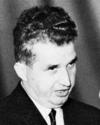- Ceauşescu, Nicolae
-
born Jan. 26, 1918, Scorniceşti, Rom.died Dec. 25, 1989, near BucharestRomanian politician.Prominent in the Romanian Communist Party, in 1965 he succeeded Gheorghe Gheorghiu-Dej as the party's leader. In 1967 he became head of state and in 1974 president of Romania. He charted an independent, nationalistic course but also maintained rigidly repressive controls over free speech and internal dissent. His harsh economic policies and grand building projects reduced Romania from relative prosperity to near starvation. He was overthrown in a revolution in 1989, and, after a hasty trial, he and his wife were executed by firing squad.
 CeauescuPictorial ParadeEB Inc.
CeauescuPictorial ParadeEB Inc.* * *
▪ president of Romaniaborn Jan. 26, 1918, Scornicești, Rom.died Dec. 25, 1989, near BucharestCommunist official who was leader of Romania from 1965 until he was overthrown and killed in a revolution in 1989.A member of the Romanian Communist youth movement during the early 1930s, Ceaușescu was imprisoned in 1936 and again in 1940 for his Communist Party activities. In 1939 he married Elena Petrescu (b. Jan. 7, 1919, Oltenia region, Rom.—d. Dec. 25, 1989, near Bucharest), a Communist activist. While in prison, Ceaușescu became a protégé of his cell mate, the Communist leader Gheorghe Gheorghiu-Dej (Gheorghiu-Dej, Gheorghe), who would become the undisputed Communist leader of Romania beginning in 1952. Escaping prison in August 1944 shortly before the Soviet occupation of Romania, Ceaușescu subsequently served as secretary of the Union of Communist Youth (1944–45). After the Communists' full accession to power in Romania in 1947, he first headed the ministry of agriculture (1948–50), and from 1950 to 1954 he served as deputy minister of the armed forces with the rank of major general. Under Gheorghiu-Dej, Ceaușescu eventually came to occupy the second highest position in the party hierarchy, holding important posts in the Politburo and Secretariat.With the death of Gheorghiu-Dej in March 1965, Ceaușescu succeeded to the leadership of Romania's Communist Party as first secretary (general secretary from July 1965); and with his assumption of the presidency of the State Council (December 1967), he became head of state as well. He soon won popular support for his independent, nationalistic political course, which openly challenged the dominance of the Soviet Union over Romania. In the 1960s Ceaușescu virtually ended Romania's active participation in the Warsaw Pact military alliance, and he condemned the invasion of Czechoslovakia by Warsaw Pact forces (1968) and the invasion of Afghanistan by the Soviet Union (1979). Ceaușescu was elected to the newly created post of president of Romania in 1974.While following an independent policy in foreign relations, Ceaușescu adhered ever more closely to the communist orthodoxy of centralized administration at home. His secret police maintained rigid controls over free speech and the media and tolerated no internal dissent or opposition. In an effort to pay off the large foreign debt that his government had accumulated through its mismanaged industrial ventures in the 1970s, Ceaușescu in 1982 ordered the export of much of the country's agricultural and industrial production. The resulting extreme shortages of food, fuel, energy, medicines, and other basic necessities drastically lowered living standards and intensified unrest. Ceaușescu also instituted an extensive personality cult and appointed his wife, Elena, and many members of his extended family to high posts in the goverment and party. Among his grandiose and impractical schemes was a plan to bulldoze thousands of Romania's villages and move their residents into so-called agrotechnical centres.Ceaușescu's regime collapsed after he ordered his security forces to fire on antigovernment demonstrators in the city of Timișoara on Dec. 17, 1989. The demonstrations spread to Bucharest, and on December 22 the Romanian army defected to the demonstrators. That same day Ceaușescu and his wife fled the capital in a helicopter but were captured and taken into custody by the armed forces. On December 25 the couple were hurriedly tried and convicted by a special military tribunal on charges of mass murder and other crimes. Ceaușescu and his wife were then shot by a firing squad.* * *
Universalium. 2010.
